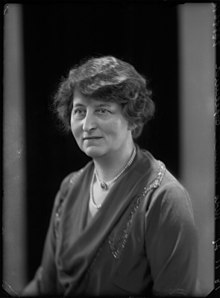Ida Copeland
|
Ida Copeland OStJ FRSA |
|
|---|---|
 |
|
| Member of Parliament for Stoke on Trent, Stoke division |
|
|
In office 27 October 1931 – 13 November 1935 |
|
| Prime Minister | Stanley Baldwin |
| Preceded by | Cynthia Mosley |
| Succeeded by | Ellis Smith |
| Majority | 6,654 votes |
| Chairman of Stoke Division Women's Unionist Association | |
|
In office 1920–1921 |
|
| Chairman of the Staffordshire Anglo Polish Society | |
|
In office 1943 – 19?? |
|
| Personal details | |
| Born | 15 April 1881 Florence, Tuscany |
| Died | 29 June 1964 (aged 89) Battle, Sussex, England |
| Political party | Conservative |
| Spouse(s) | Richard Ronald John Copeland |
| Residence | Trelissick |
| Occupation | Envoy |
Ida Copeland OStJ FRSA (née Fenzi; born 15 April 1881 – 29 June 1964) was an Anglo-Italian British politician. She was active in social welfare both locally and nationally, particularly the Girl Guides, and was one of the earliest women to join Parliament, sitting as a Conservative MP for Stoke on Trent from 1931–35.
Ida was born in Florence, Tuscany, the daughter of Italian Cavalier Camillo Fenzi (1852–1883), and his English wife, Evelyne Isabella, daughter of Sir Douglas Strutt Galton and Marianne (née Nicholson), a first cousin of Florence Nightingale, who were married in 1875. Ida was the great granddaughter of Cavalier Emanuele Fenzi, Senator of the Grand Duchy of Tuscany and banker (Banco Fenzi), granddaughter of Cavalier Sebastiano Fenzi and his wife, Emily Verity.
On the death of her father, she and her brother Leone inherited the Villa di Rusciano designed by Brunelleschi for the Dukes of Urbino. Copeland grew up in Italy and moved to England at the end of the 19th century. In 1898, her mother married Leonard Daneham Cunliffe, an influential London financier, Governor of the Bank of England, President of the Hudson's Bay Company and one of the major investors in the Harrods department stores.
...
Wikipedia
